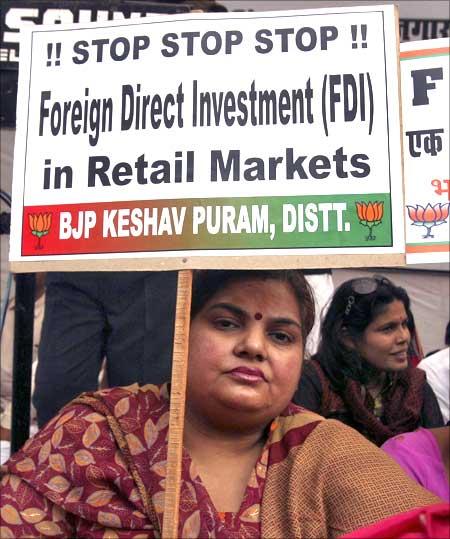
The recent Cabinet decision to allow 51 per cent foreign direct investment in the multi-brand retail sector in India has deeply divided the nation's political, social and trading classes.
The main opposition -- the Bharatiya Janta Party and the Left parties, alongside with DMK and TMC -- has vehemently opposed FDI in retail in India. Parliament has been stalled over this issue.
However, the Confederation of Indian Industry and the Federation of Indian Chambers of Commerce and Industry have not only supported the government's move, that will in many ways revamp the retail sector, but also argued that the induction of foreign investors in the segment will benefit both the consumer and the small traders in the long run.
The CII, India's largest and most influential trade lobby, has recommended a calibrated approach for introducing foreign investment in the retail sector in terms of the percentage and minimum capitalisation requirements.
. . .
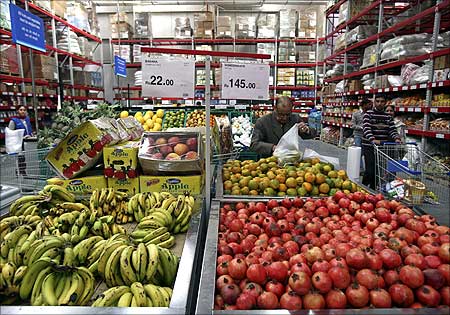
FDI in multi-brand retail will give a boost to the organised retail sector, which positively impacts several stakeholders, including producers, workers, employees, consumers, the government, and, hence, the overall economy.
In a true potential scenario, opening up of FDI can increase organized retail market size to $260 billion by 2020.
Best case scenario: Opening up of FDI in retail can increase organised retail market size to $260 billion by 2020.
This would result in an aggregate increase in income of $35-45 billion per year for all producers combined; about 3-4 million new direct jobs and around 4-6 million new indirect jobs in the logistics sector, contract labour in the distribution and repackaging centres, housekeeping and security staff in the stores.
. . .
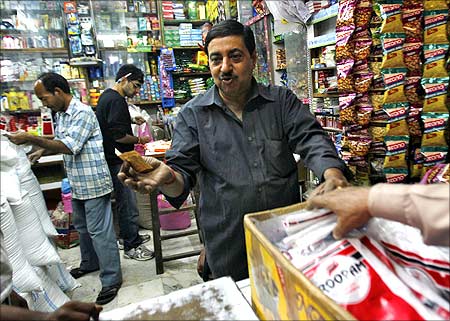
The government too stands to gain by this move by transparent and accountable monitoring of goods and supply chain management systems. The government can be expected to receive an additional income of $25-30 billion by way of a variety of taxes.
SMEs
FDI can help SMEs supply in: large volumes, increase quality and become a vendor to international players and increase the quality of products and become cost competitive in global arena.
Traditional trade will continue to have its own place and should not decline. Even in the last three years when modern retail has grown 24 per cent, unorganised retail has continued to grow, albeit at a slower rate of 10-12 per cent.
Example of Small-Scale Industries (SSIs): In 1990s when dereservation of small-scale industries (SSIs) was introduced in India, there was speculation around the eventual decline of SSIs.
. . .

Since then several studies have shown that the sector continues to demonstrate a healthy growth in the number of units, output and employment.
As an example, the growth for the early period of liberalization (1993-1994 to 1998-1999) which was 16 per cent, fell slightly for the next 5 years (1998-1999 to 2004-2005) to 12 per cent, before accelerating to 19 per cent in the last 5 years (2004-2005 to 2008-2009).
Similarly, the employment generated by registered SSIs grew at 6 per cent in the pre-liberalisation era 1979-1980 and 1989-1990, at 4 per cent in the first decade of the post-liberalisation era (1993-1994 to 2003-2004), and accelerated to 19 per cent in the last 5 years (2003-2004 to 2008-2009).
Better service of small retailers: AnICRIER study, 'Impact of Organized Retailing on the Unorganized Sector, 2008', shows no evidence of a decline in overall employment in the unorganised sector as a result of the entry of organised retailers.
. . .

Rather small retailers evolve -- like adding new product lines and brands, better display, renovation of the store, introduction of self-service, enhanced home delivery, more credit sales, acceptance of credit cards, etc.
Farmers
Farmers in India today receive a small share of the end consumer price.
As an example, for tomatoes, farmers in India earn only 30 per cent of consumer price, while in more developed markets this is in the 50-70 per cent range.
Organised retail has the potential to drive efficiencies in this chain by:
(a) Increasing price realisation for farmers by 10-30 per cent through sourcing directly or closer to the farm.
. . .
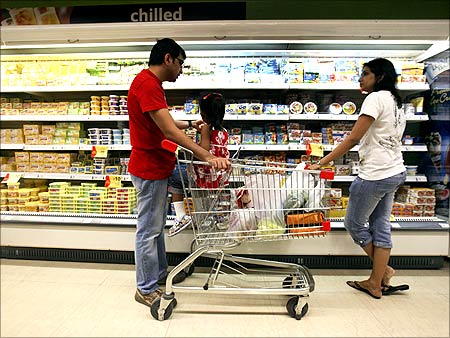
(b) Reducing handling and wastage by 25-50 per cent through consolidation as well as investments in technology, either directly or through aggregators.
(c) Upgrading the farmer's capabilities by providing know-how and capital.
(d) Improving farmers' output and yield through better extension services and user friendly processes.
Food Security
In case investments are not made in agricultural back-end and supply chain, it will become difficult to meet India's growing demands for fruits and vegetables, dairy and poultry products.
. . .

In fact, any delay in these investments will endanger availability for our future generations.
Consumers
This would result in wider choice for the consumer with better competition
It also would lead to assurance of quality with greater transparency and easier monitoring of adulteration, counterfeit products and traceability.
Furthermore, it would lower prices that can help curb inflation. With its ability to drive efficiencies and leverage scale, modern trade is able to increase affordability for consumers.
. . .
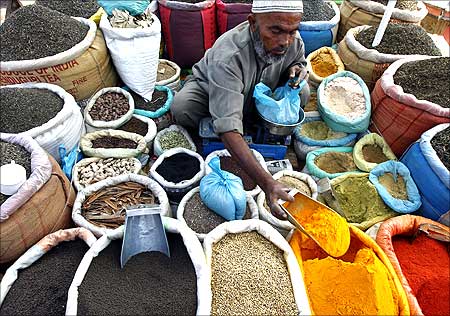
For a low income family, organised retail has the ability to lower the cost of the monthly consumption basket as much as 5-10 per cent.
Reacting to widespread fears on how the advent of foreign companies with huge credit for investments affects the small and medium traders in the country, FICCI's secretary general Rajiv Kumar assured, "Allowing FDI will bring development of a robust supply chain, which in turn will help in integrating farmers and small and medium size enterprises."
Ficci members explained that whatever investments foreign retailers want to make in India, a fixed per cent of it will have to be invested on setting the back-end infrastructure right.
An adequate supply chain for procurement of food will have to be established, and since other retailers will have to provide for equal or better quality products, it will straighten the overall infrastructure in this sector.
. . .

Sanjay Bhatia, chairman of FICCI, MSME (micro, small and medium enterprises) committee, argued that the presence of world-class retailers in the foray would boast the competition in this sector.
And as a result, the consumer will get better quality products, the retailers would be forced to put their infrastructure in place to get improved quality, and since there would be too many wooing the farmers to sell off their produce, the farmers too would get better prices for their yield.
"Yes, I can understand that the small traders are apprehensive and worry how it will affect them," Bhatia said. "There have been protests. But one must not forget that there already are big players -- Big Bazaar, Reliance, etc-- in the market, and the small traders and corner shops are flourishing alongside," he added.
He cited that in the earlier days of value-added tax (VAT), a few states like Haryana had resisted the move. But later on when they and the other states examined its benefits, they too applied VAT to the services.
"The small traders will see their benefits in the years to come," Bhatia assured.
. . .
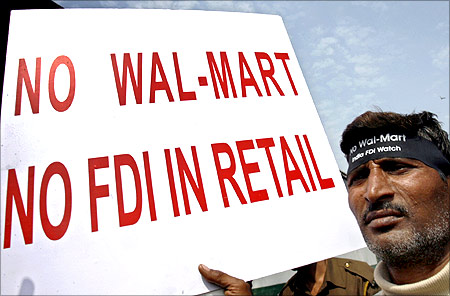
Currently, the retail sector in India is worth $450 billion, which is most likely to increase to $850 billion in the next ten years.
Approximately 35 per cent of the material is sourced directly from SMEs. In a bid to calm the small traders, who feel most vulnerable, Ficci members argued that as the market of retail grows and foreign investors come into play, the dependence on SMEs to provide for raw material will also grow.
Citing some examples, Bhatia said that global retailer Carrefour sources 90 per cent of its material from local small and medium enterprises.
Quoting another example, he said that 96 per cent of the products sold by Walmart in the United States are sourced from local SMEs.
He added the FDI will help in encouraging smaller suppliers to take their products to a national platform, which was not able to happen earlier because of a lack of an organised supply chain.